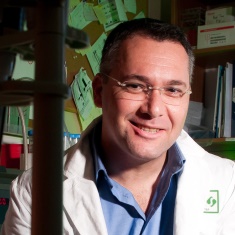
A clinical study on a promising treatment for Type 1 diabetes developed by Dr. Eli Lewis, a BGU researcher, in collaboration with the University of Colorado Health Science Center had an “exceptional outcome” after an eight week treatment of Alpha1-Antitrypsin (AAT). According to the study published in the Journal of Clinical Endocrinology and Metabolism, the goal was to evaluate the safety and effect of a novel therapy using the anti-inflammatory serum protein Alpha1-Antitrypsin (AAT) in Type 1 Diabetes patients in the first of three published Phase 1 open trials.
“Following treatment of eight to 12 weeks with AAT, in several patients, it allowed proper glucose levels to be controlled without the need for any insulin injections for more than two years,” said Lewis, who is director of the BGU Clinical Islet Laboratory and a lecturer in clinical biochemistry, pharmacology and immunology for the Faculty of Health Sciences at BGU, "In addition, diabetes patients, even youngsters and adolescents, showed no adverse affects and a remarkable safety profile.”
“This is an excellent beginning in our mission to determine the exciting possibilities of a safe therapy for autoimmune diabetes,” Dr. Lewis explains. “We believe we will see similar results in a number of U.S. patients who recently received this treatment outside the trials within several months of diagnosis and are still completely insulin free.”
The researchers are now recruiting for three more extension trials. However, it will still be a minimum of two years for AAT to receive FDA approval as an on-label treatment for Type 1 Diabetes. The treatment course was comprised of a weekly infusion-drip of AAT, then a year-long follow-up with 12 patients. “Patient compliance was maximal, an impressive achievement when one considers several ongoing trials in Type 1 Diabetes that offer poorly tolerated approaches,” Dr. Lewis explains.
The Study was funded by Omni Bio Pharmaceutical Inc. Dr. Charles A. Dinarello has received research support from National Institutes of Health, grant AI 15614.
Alpha1-Antitrypsin Therapy Downregulates Toll Like Receptor-Induced IL-1b Responses in Monocytes and Myeloid Dendritic Cells and may Improve Islet Function in Recently Diagnosed Patients with Type 1 Diabetes
Peter A. Gottlieb§, Aimon K Alkanani§, Aaron W. Michels§, Eli C. Lewis†, Leland Shapiro, Charles A. Dinarello¥, and Danny Zipris§
§Barbara Davis Center for Childhood Diabetes, University of Colorado Denver, Aurora, CO 80045; ¥University of Colorado Denver, Division of Infectious Diseases, Aurora, CO 80045;
†Department of Clinical Biochemistry & Pharmacology, Faculty of Health Sciences, Ben-Gurion University of the Negev, Beer-Sheva, Israel; Department of Medicine, Division of Infectious Diseases, Veterans Affairs Medical Center and University of Colorado Denver
